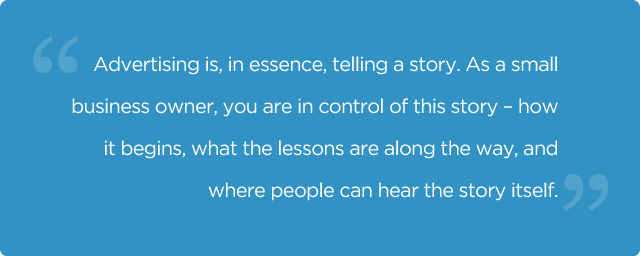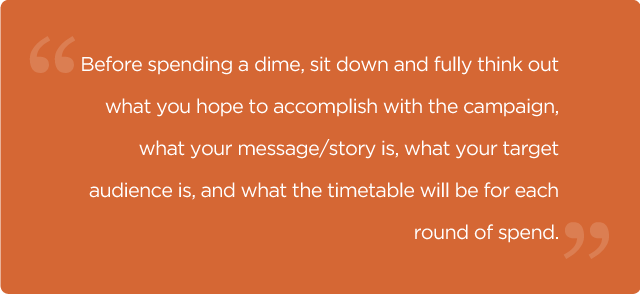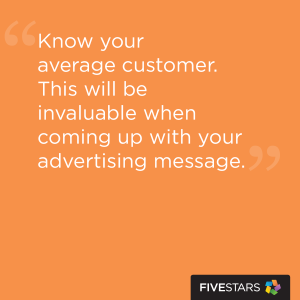The old adage of “You have to have money to make money” is an old adage for a reason – it’s almost universally true. This applies not only to personal wealth but also your business’ financial well-being.
You will of course need to invest in employees, new equipment, supplies and other business necessities, but you will also need to spend some money (and time) advertising. Even with more avenues than ever before to raise public awareness, advertising is still one of the most surefire ways of increasing your footprint.
How You Can Wisely Spend Advertising Dollars to Stand Out from the Clutter
As a small business owner, however, you are very unlikely to have an exceedingly large advertising budget. You won’t be able to throw money at a variety of different campaigns and see what works best – you don’t have the kind of capital to afford carrying out ineffective ad spends. And trying to elevate your business and your message above the fray of your competition can be tough, especially with limited funds. What’s a small business owner to do? Well, he or she could start by keeping these 10 key points in mind when getting ready to advertise.
1. Identify and Target Your Audience
Spend some initial time to really get to know your average customer. Having a good working knowledge of who comes in and buys your products most often (age, gender, occupation, average income, etc.) will be invaluable when coming up with your message and your targeted outlets. Ad managers for media outlets can offer you incredibly detailed information on their customers, but it will be all for naught if you don’t know your own customer. If a website you are contemplating running a banner ad with tells you that its average visitor is a 45-year-old female who makes approximately $48,000 per year and is online an average of 5 hours a day, what good is that knowledge if you don’t know who’s buying your products?

Spend the time to acquire this valuable data so you can use it as one of your largest indicators of where your advertising budget should go, allowing you to reach the people most likely to be interested in your business and its services.
2. Stay On Message
Advertising is, in essence, telling a story. As a small business owner, you are in control of this story – how it begins, what the lessons are along the way, and where people can hear the story itself. A big component of successful small business advertising is making sure this story makes sense, is applicable to your business, and is of interest to your potential customers.
Make it short and sweet – trying to tell too many things in an advertising campaign is one of the best ways to ensure customer confusion. Pick something that you know sets your business apart from the competition and hammer it home with every piece of advertising you purchase. Your customers will eventually come to associate that message with your brand, which is a true sign of effective advertising. If your bakery makes the best red velvet cupcakes in the tri-county area and that’s the biggest reason why people come through your doors, make sure that everyone knows about them.
3. Diversify and Experiment
As mentioned earlier, small business owners do not have the luxury to execute several high-dollar ad campaigns at once to see which is most effective. But that’s not to say that they shouldn’t experiment. With today’s variety in advertising methods, it is surprisingly easy to spend smaller amounts of your advertising budget across a wider variety of channels and receive tangible and surgically-accurate data as to the effectiveness of the spends.
Institute various online advertising spends with a low maximum dollar ceiling – many sites offer models that only charge on interaction, meaning you only pay for click-throughs and you never go over budget as your ad is pulled once the maximum clicks are generated. Try coupons or discounts for a variety of items and through a variety of channels.
Even simply asking each customer how they heard about your business or why they’re coming in today is an effective litmus test as to where and how you’re reaching people and what they’re most interested in. Just be sure to give each “experiment” an ample amount of time to provide a large enough sample group, and avoid running multiple examples in the same time period.
4. Plan
One of the biggest mistakes business owners make when undertaking ad spends is being reactive rather than proactive. Before spending a dime, sit down and fully think out what you hope to accomplish with the campaign, what your message/story is, what your target audience is, and what the timetable will be for each round of spend. If you have a variety of spends (which you should, as we learned above), don’t panic and react too quickly if one isn’t meeting expectations. Stick to your plan and timetable and you’ll be able to fully assess the success metrics once everything is completed.
5. Be Genuine and Credible
A constant problem with advertising is the snake-oil-salesman-vibe that many people associate with advertisements in general. The best ads make people forget they’re interacting with an ad at all. As consumers become savvier and ad-weary, disseminating any sort of embellishments, exaggerations or out-and-out misinformation will not be worth it in the long run.
Claims that are obviously subjective (“World’s Best Cup of Coffee”) are fine, but try to be as factual and as straight-forward as possible. Earning consumer trust is hard to do, but ruining it forever with misleading claims is a guaranteed way to lose it.
6. Be Easy to Contact
Advertising will make sure people hear about you, but what then? Ensuring that all of your ads have a phone number, email address, URL or even all three will remove one additional barrier to interacting with your customers. Make sure that your website or place that your ad directs consumers has your contact information prominent and easy to navigate to. Throw everything you can think of on the page (address, phone, fax, links to all social media profiles) to cover all of your bases.
7. Be Charitable
Getting involved with charity and donating services and time to charitable causes is not only a great way to make you feel good, but it can also be a boon for your business. It is a highly effective method to be seen by your community members and fellow businesses, and the donation of goods and/or services can be viewed as an ad spend, essentially, since people are seeing your company name and/or logo. The money or its equivalent in good/services will be going towards a good cause, as well.
8. Focus On Online
It seems silly to have to mention these days, but a surprising amount of small businesses don’t have enough of an online presence, especially in terms of online advertising. Google AdWords can yield an amazing amount of genuine traffic to your site from the largest search engine in the world, and campaigns can be effective for as little as $10 per day, which is easy on your advertising budget.
Facebook Ads are also highly effective and allow you to reach an incredibly small, targeted audience by setting strict parameters for who sees your content. And StumbleUpon’s paid discovery options allows you to pay for unique traffic for as little as $0.05 per click. Most online advertising networks allow the purchaser to implement a max spend as well, ensuring you never go over budget.
9. Seek Out Free Publicity

Be a regular reader of media outlets that cover your industry – not only will you understand their audience and evaluate if it makes sense to spend money on advertisements with them, but you can also be kept in the loop for organic, non-paid exposure. Pitch yourself or another employee for guest-authored segments. Get in contact with the outlet’s editorial team and introduce yourself, encouraging them to contact you for interviews, ask-an-expert segments, trend stories, and the like. The result of organic free publicity is the same as advertising, but without having to pay for it. Win win.
10. Manage Profiles
While the value of setting up accounts on Facebook, Twitter, Foursquare, etc. should be obvious, there are several online directory sites that are worth your time to make sure your business is discoverable on. Sites like Yahoo! Local, Google Local, Bing Local, Manta and Yahoo! Trip Advisor all allow business owners to make profiles – for free – and take advantage of the innumerable people on the platforms searching for businesses in your local area. It’s online advertising that won’t cost you anything except a little bit of time.
Spending Your Time and Money Wisely is the Secret to Small Business Advertising Success
There is a lot to keep in mind, but it will prove invaluable to the success of your advertising campaigns and your business in general if you do. Small business owners have precious little time and money to waste, so successfully spending those assets when advertising is doubly crucial. By adhering to a few general guidelines, you will be doing your part to ensure that your advertisements reach as many potential customers as possible, and thus, ensuring that your small business has its best fighting chance at success.







Leave a Comment